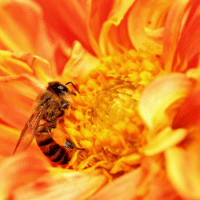
We’ve all heard the bad news: An epidemic is wiping out honey bees in California and the nation. Bee populations have been declining significantly over the past 25 years, and a substantial and growing body of evidence points to neonicotinoid pesticides as a key factor. The Golden State has a special responsibility to respond to this threat: Our state’s agricultural production accounts for more food than any other state in the nation – and that means our local economies depend on the health of honey bees.
Tell your State Senator to act to save the bees and vote YES on the Pollinator Protection Act!
Why are we hearing so much about bees lately? Last year, California beekeepers lost nearly 40 percent of their hives, a rate more than twice what is sustainable. In addition, wild bee populations have declined 23 percent between 2003 and 2008 in the Central Valley and other important agricultural regions of the nation.
Given the staggering decline of honey bees in California, Senators Ben Allen and Scott Weiner have introduced legislation that would protect pollinators against toxic pesticides that are contributing to bee colony collapse. Senate Bill 602 will inform retail consumers about plants and seeds that have been treated with neonicotinoid pesticides and will make the chemicals available for use only by trained professionals.
Amazingly, bees pollinate one in three bites that we eat, and their decline poses a serious threat to our food supply, the viability of agriculture, the livelihoods of beekeepers and the sustainability of our environment. Nearly 100 varieties of fruits depend on them for pollination, including produce like almonds, cranberries, avocados, and apples. They also help to generate more than $15 billion in agricultural production in the U.S each year!
In 2014, the Task Force on Systemic Pesticides determined that neonicotinoid pesticides are a key factor in bee colony decline. The chemicals kill some bees outright, but also impair their ability to communicate, navigate and reproduce. It’s up to Californians to help reverse this trend by making sure our lawmakers vote YES on SB 602. Contact your state Senator now.
Unfortunately, many well-meaning Californians buying bee-attractive plants at their neighborhood nurseries are unknowingly exposing wild bees to harmful chemicals. We can help reduce the risk to bees by informing consumers about the harm these pesticides present to beneficial insects.
The Pollinator Protection Act will require labeling of all retail plants and seeds that have been pre-treated with neonicotinoids, indicating that the products can harm bees. The bill will also ensure that these pesticides are available for sale only to certified applicators, farmers, or veterinarians, which will prevent overexposure and overuse by people who are not properly trained. The bill is sponsored by Bee Smart California, a coalition of food, farming and beekeeping organizations.
A survey of bee-attractive plants purchased at home and garden retailers across the country found that more than half contained levels of neonicotinoids at levels that could kill bees outright. Consumers also often overuse the chemicals, which may be applied at a rate 120 times higher than what is approved for agricultural uses.



